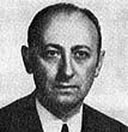Frigyes Csáki
From 1949 to 1951, he was an intern and then an assistant professor at the Department of Electrical Machines and the Department of Special Electrical Machines of the Budapest University of Technology (BME). In parallel, from 1951, he also taught at the Technical University of Heavy Industry (NME) in Miskolc.
In 1954, he was appointed head of the scientific department of the Electric Power Research Institute (VILLENKI, later VEIKI). In 1956, he became an associate professor at the Department of Electrical Machines of the BME; between 1956 and 1961, he was a scientific associate of the Automation Research Group of the Hungarian Academy of Sciences (MTA), one of its founders.
From 1961 until his death, he was the head of the Department of Automation (AUT) at BME, which he founded. In 1963–1964, he was the Vice-Rector for Education at BME; and from 1964 to 1969, he was its Rector.
From 1964, he also served as deputy director of the Hungarian Academy of Sciences Automation Research Institute (AKI), which was established from the Hungarian Academy of Sciences Automation Research Group.
In the first phase of his scientific career, he dealt with theoretical problems of electrical machines. From the beginning of the 1960s, his interest turned towards the electronics of high-voltage industrial equipment, through which he focused on control engineering and control theory (automatics), as well as process control and digital control. With his school-creating research and basic textbooks, he laid the foundations for the education of power electronics and automatics in Hungary. In his university department, he did a lot for the modernization of electrical engineering training in general.
In 1954 he became a candidate of technical sciences, in 1960 he became a doctor of technical sciences. In 1965 he was elected a corresponding member of the Hungarian Academy of Sciences, and in 1976 a full member. Between 1970 and 1973 he was a member of the Hungarian Academy of Sciences' presidium; then from 1976 until his death he was its vice-president. In 1971 he was made an honorary doctor of the Moscow Institute of Power Engineering (MEI).
He was the chairman of the Hungarian Electrotechnical Association (MEE) and the Hungarian National Committee of the World Organization of Generation Systems and Cybernetics (WOSC). He was also the chairman of the Hungarian National Committee of the international Pugwash Movement, which discusses science and world problems.
From 1972 he was one of the editors-in-chief of the journal Problems of Control and Information Theory, published in Budapest.
His awards: Academic Award (MTA, 1961); Gold Order of Labor Merit (Hungarian State, 1967); Liberation Jubilee Commemorative Medal (Hungarian State, 1970); First Class State Award (1973); István Kruspér Memorial Medal (Measurement Technology and Automation Scientific Association (MATE), 1977).
- He was not admitted to university because of his origin, so in 1939 he worked as a weaving mill worker and machine operator in Pesterzsébet while attending a textile school. After 1942, the authorities took him to forced labor several times. He escaped when he was last called up and hid until the spring of 1945. In 1945, he was finally able to enroll in the József Nádor University of Technology and Economics. In parallel with his studies, between 1946 and 1948, he also worked as an intern in two Budapest electrical factories. He finally obtained a mechanical engineering degree in 1949.
Created: 2017.02.02. 16:00
Last modified: 2025.06.26. 12:45

